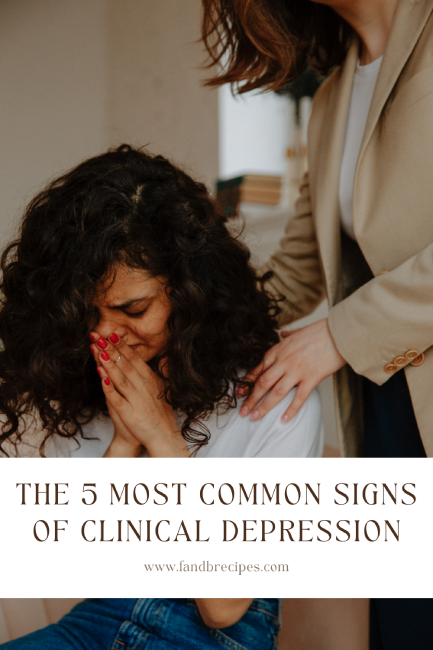The 5 Most Common Signs of Clinical Depression
Clinical depression is one of the most common mental health disorders. Also known as major depressive disorder, it affects more than 5% of adults across the globe.
It is normal for people to feel sad, hopeless, or despondent at some point in their lives. These emotions are even more common when individuals go through a tough phase in their personal or professional life.
However, when negative emotions and depressive feelings persist for weeks or months, they can wreak havoc on a patient’s physical and mental wellbeing. They disrupt an individual’s routine life and interfere with their ability to retain a job, secure their finances and maintain healthy relationships.
Despite the prevalence of clinical depression, patients often spend months or years without a concrete diagnosis. It is because the symptoms of depression aren’t easily recognizable. Individuals might go through a major part of their lives not knowing why they feel empty, sad, or hopeless.
Nevertheless, there are a few characteristic symptoms that indicate a patient has clinical depression.
This article will take a closer look at the most prominent signs of clinical depression.
Clinical Depression Treatments: An Overview
The symptoms of clinical depression can be crippling and painful. Apart from emotional distress, the condition also manifests itself in physiological symptoms, such as gastrointestinal problems and body aches.
But it is important to remember that getting diagnosed with major depressive disorder isn’t a death sentence.
Today, patients have access to a wide array of clinical depression treatments that help them effectively manage their condition. With the right treatment, patients can lead healthy and fulfilling lives.
Common treatments for clinical depression include:
- Antidepressants or SSRIs (selective serotonin reuptake inhibitors)
- Cognitive-behavioural therapy (CBT)
- Group therapy
- Psychotherapy
- Eye movement desensitization and reprocessing (EMDR)
Alternative treatment options, such as cannabinoids, also seem to work for some patients.
Apart from medical treatment, a healthy lifestyle and diet are also important for the proper treatment of clinical depression. Mindfulness meditation, exercise, yoga and journaling can go a long way to alleviate the symptoms.
In extreme cases, patients might have to undergo medical procedures, such as electroconvulsive therapy (ECT) or transcranial magnetic stimulation (TMS).
What Causes Clinical Depression?
Medical researchers are yet to identify the precise cause of clinical depression. However, certain factors increase an individual’s predisposition to the condition. These include:
- A family history of mental health disorders
- Major life events, such as a divorce, retirement, relocation, etc.
- The death of a loved one
- A history of physical, emotional, or sexual abuse
- A propensity for substance abuse
- Social isolation
Additionally, women are more likely to undergo depressive episodes due to hormonal changes during pregnancy and menopause.
Characteristic Symptoms of Clinical Depression
Clinical depression is more than a feeling of sadness that lasts for a few days. Most patients hesitate to seek treatment because they don’t know how to distinguish between the two.
Here are a few important signs that indicate a person is going through a major depressive episode:
#1. Mood Changes
One of the first signs of depression includes subtle changes in an individual’s mood and thought patterns.
Patients often find themselves feeling hopeless and empty without any obvious reason. Also, they might experience negative emotions, such as guilt, self-hatred and worthlessness. These symptoms can take a toll on their self-esteem.
Additionally, patients lose interest in activities they used to enjoy once. They struggle to find a sense of purpose. Also, they lack the motivation to complete routine activities, such as getting out of bed and dressing up for work.
It is also common for patients to struggle with managing their emotions. Moments of laughter and euphoria could be followed by uncontrollable sobbing without any apparent trigger.
Other signs include anxiety, overthinking and lack of concentration. Patients could struggle to remember simple things as well.
#2. Sleep Disturbances
Clinical depression often causes major changes in sleeping patterns. Patients struggle to fall asleep (insomnia) or stay asleep for longer than usual (hypersomnia). Also, they have trouble staying asleep throughout the night and waking up in the morning.
It is important to note that insomnia and nighttime awakenings are caused by various sleep disorders, including sleep apnea. Patients should consult their primary care provider to rule out other causes.
#3. Extreme Fatigue
It is normal to feel exhausted after a hectic day. But patients with clinical depression often experience debilitating fatigue. Routine activities, such as preparing a meal or doing the laundry, can leave them feeling drained of energy.
Their energy levels are low throughout the day, even if they have just woken up in the morning. It could be attributed to sleep deprivation, loss of appetite and lack of motivation caused by depression.
As with insomnia, fatigue is associated with other medical conditions, such as respiratory disorders and hypothyroidism. Patients are advised to consult a medical professional to identify the root cause of their low energy levels.
#4. Changes in Appetite and Weight
Patients with clinical depression can resort to overeating or not eating at all.
Feeling exhausted and demotivated can result in loss of appetite. That, in turn, could lead to a drastic drop in weight.
On the other hand, some patients use eating to cope with their symptoms. They are particularly drawn to foods that are loaded with carbs and sugar. That could cause them to become overweight or obese.
If an individual experiences a sudden change in eating habits and appetite, it is important to seek medical attention.
#5. Suicidal Thoughts
Suicidal thoughts or attempts are the most obvious signs of depression. While some patients resort to risky and self-destructive behaviour, others exhibit subtle clues, such as:
- Talking about death and suicide
- Visiting loved ones to say goodbye
- Expressing doubt or hopelessness about their existence
- Getting affairs in order
It is worth remembering that patients start showing these symptoms way before a suicide attempt. They are advised to get in touch with a mental health professional before their suicidal thoughts spiral out of control.
Final Takeaways
From insomnia and fatigue to obesity and anxiety – clinical depression can manifest itself in different ways. Also, the symptoms can vary from patient to patient.
The important thing is that effective clinical depression treatments are available to cope with the condition. Patients should monitor their symptoms and seek medical care early on.





Very good site you have here but I was curious about if you knew of any community forums that cover the same topics talked about in this article? I’d really love to be a part of community where I can get responses from other experienced people that share the same interest. If you have any suggestions, please let me know. Cheers!